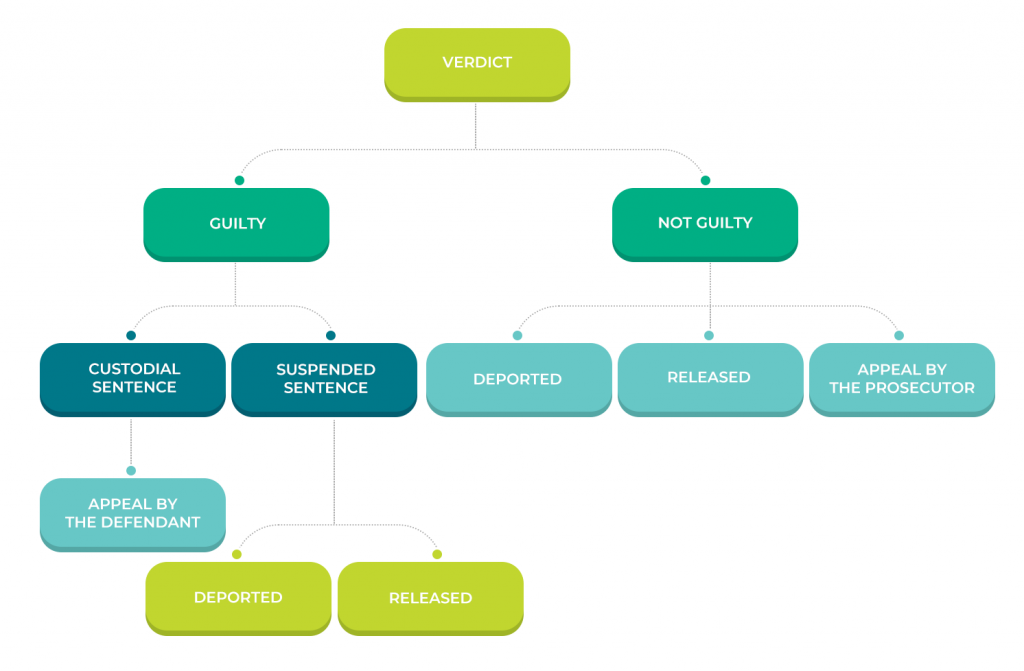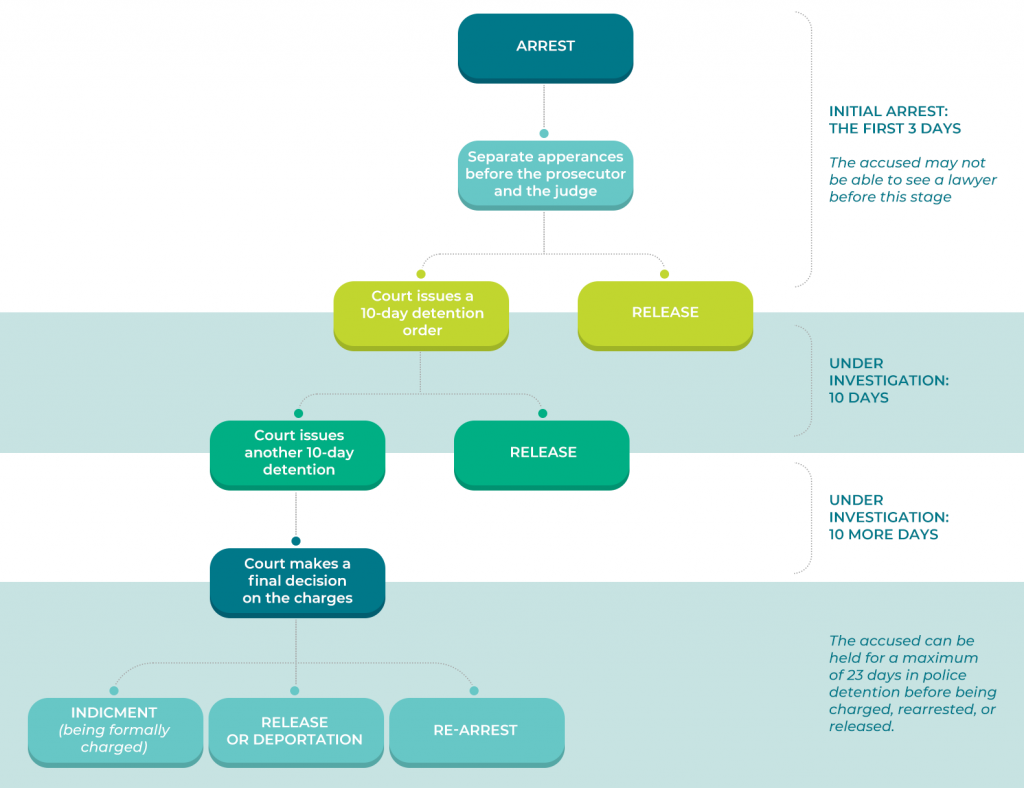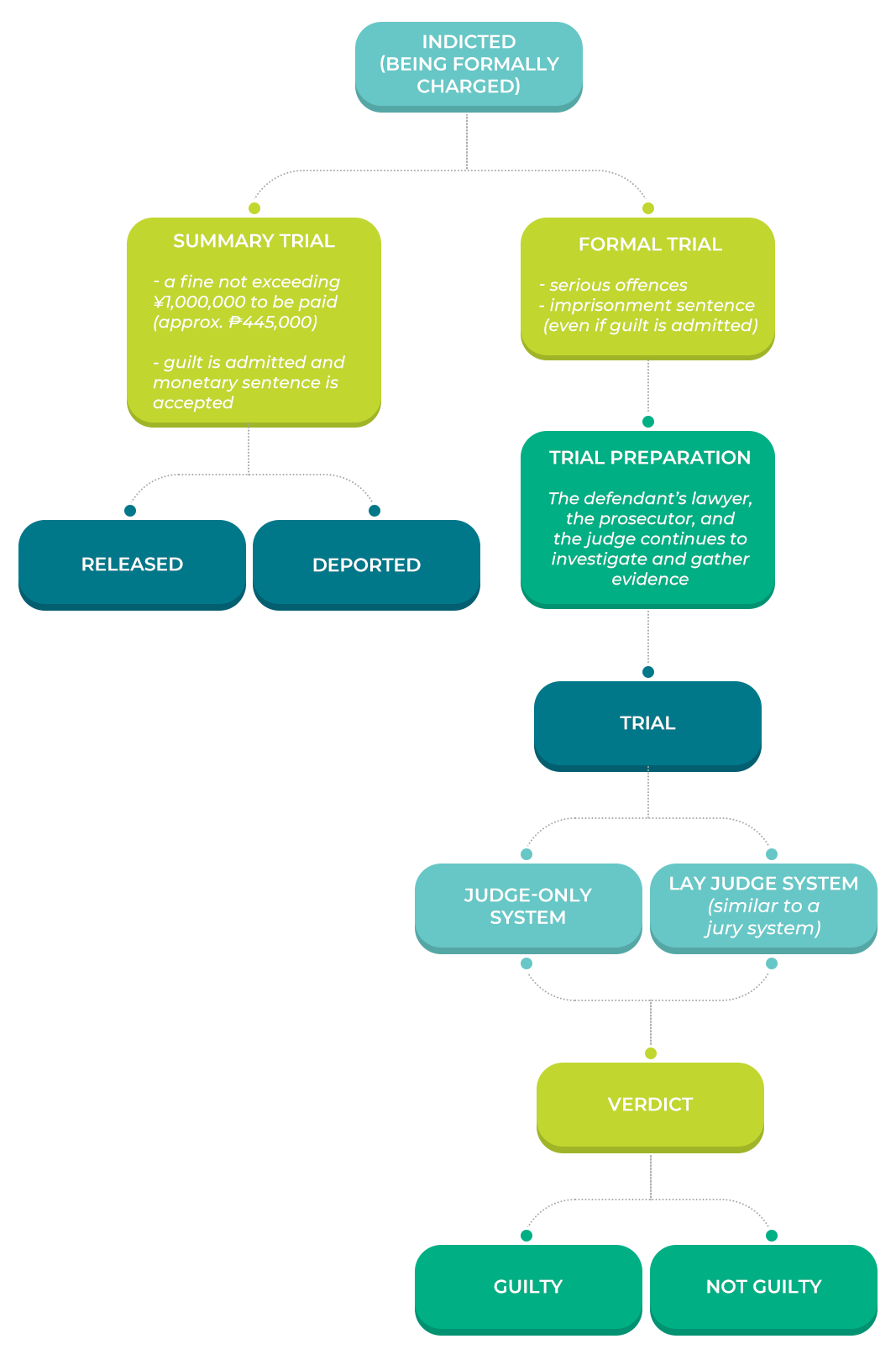Arrest Procedures
- The Pre-indictment Stage: Initial Arrest – The first 3 days
Under Japanese law, you may be arrested or detained without bail for 48 hours by the police on suspicion of having committed a crime. During this period, the police are required to inform you of the following:the crime of which you are suspected,the- right to remain silent,
- the right to hire a lawyer at your own expense,
- the right to request a court-appointed lawyer, and
- the right to have the Embassy or the consulate notified of your arrest.
The police usually begin their initial questioning before the accused gets an opportunity to see a lawyer. If an arrested individual is incapable of hiring a lawyer, they can request for a court-appointed lawyer.
If the police believe they have enough evidence to detain you, they must present this evidence to a public prosecutor within the initial 48-hour detention period. The suspect appears before the prosecutor when the police present the evidence. If the prosecutor deems the evidence sufficient, they must then obtain a warrant of detention from a judge within 24 hours. Again, the suspect would appear before the judge when the warrant is requested. A case could be dropped at either of these stages for lack of evidence, or the investigation may continue.
Anyone arrested can request for an attorney on duty (Toban Bengoshi) from the nearest bar association who can visit you once free of charge. Simply ask the police to contact the “Toban Bengoshi” for you. The police have telephone numbers for the nearest bar association for “Toban Bengoshi.”
- Under Investigation: The next 20 days
If the judge agrees that there is probable cause to believe that a crime has been committed, the court will issue an initial 10-day detention order to permit the prosecutor to continue their investigation. At the end of this 10 day period, the prosecutor can, and usually does, request a second 10-day detention period to continue the investigation even further. The arrested individual will normally appear before the judge at each of these hearings and may be asked to testify on their own behalf.
At the end of this 23-day detention period, the prosecutor must either decide to:
- press charges (filing a formal indictment to the court);
- re-arrest the detainee; or
- release the detainee.
The public prosecutor can ask for the indictment (formal charge) earlier if they think they have enough evidence. The suspect will be brought before a judge once again and be formally indicted. Prosecutors in Japan generally do not take a case to trial unless they are convinced they can win. After indictment, the conviction rate in Japan is over 99 percent. If indicted, the defendant is usually transferred to the regional detention prison where they will be held for the duration of the trial.
Alternatively, an earlier release is possible if there is not enough evidence, or a settlement is reached with the injured party (e.g. in the case of assault or criminal damage). This means an accused can be held for a maximum of 23 days in police detention before being charged, rearrested, or released.
- The Post-indictment Stage: The Trial
Evidence is gathered between the indictment (being formally charged) and the trial. Depending on the nature of the case, there can be long delays during this process. This can range from two months to 18 months or even more depending on the nature of the crime.
Judges, prosecutors, and defence lawyers conduct pre-trial discussions to plan for court hearings. Although the defendant is present, these discussions are not part of the trial itself.
Cases tend to be heard by a panel of three judges. There is no trial by jury in Japan. Serious crimes tend to be heard under the lay judge system (saiban in), which consists of a panel of three professional judges and six lay judges (members of the public). Lay judges can decide sentences with an authority largely equivalent to that of the professional judges. The system is similar to a jury system.
The following crimes will generally be tried under the lay judge system:
- Drug cases involving possession for commercial profit of significant amounts of stimulant drugs (i.e. more than 500g)
- Inflicting bodily injury resulting in death
- Dangerous driving resulting in death
- Negligence (as guardians) resulting in death
- Rape resulting in death
- Arson resulting in death
- Burglary resulting in death
- Murder
A trial will typically begin by identifying the defendant and reading the charges against them. The defendant will be advised of the right to remain silent and to refuse to answer individual questions. The defendant will be given an opportunity to make a statement about the charges but warned that the statement could be used against them. The defendant then enters a plea. Following this, the attorney makes the opening statement for the defense followed by the prosecutor’s opening statement.
If the case is complex, subsequent sessions will be held for the prosecutor and the defense to present evidence. After all the evidence is presented, the prosecutor and the defense make their closing arguments. The judge will then set a date to render their judgment and sentence. Even with a guilty plea, a trial will usually consist of a minimum of two sessions.
- Sentencing

A. GuiltyJapanese courts examine evidence to prove guilt and determine the sentence during the same trial procedures. When the court has been persuaded that the defendant, beyond all reasonable doubt, has committed the offence as charged, a sentence may be rendered directly, without a declaration of guilt.
B. Not Guilty
When the court thinks reasonable doubt remains, it will give a “not guilty” judgement based on a failure to prove the crime. If found not guilty, the defendant must be compensated by the Japanese Government for his/her detention. However, a not guilty verdict does not necessarily secure a defendant’s release.
Prosecutors can and do appeal not guilty verdicts, usually successfully, according to Japanese Government statistics. If the prosecutor requests an appeal, the defendant may be detained until the next trial date. Prisoners normally receive partial credit for time served prior to the conviction, but there is no automatic right. The amount of credit awarded is announced during judgement.
- Suspended sentences
Those found guilty of less serious offences may receive a sentence of imprisonment, which is then suspended for between 1 and 5 years. This is possible if:
- the sentence to be suspended is less than three years in prison;
- the fine, if applicable, is less than ¥200,000;
- at least five years have elapsed since the completion or remission of any previous sentence.
If you are found guilty of another offence during the period of suspension, both the original and new sentence will be served. Those receiving heavier sentences will serve their sentence or pay their fine in Japan.
- Custodial sentences
Those who receive a custodial sentence must serve their sentence and/or pay all applicable fines. These types of sentences are divided into two categories:
- Imprisonment with labor
– This aims to promote smooth rehabilitation by giving prisoners vocational knowledge and skills. They work in designated fields corresponding to their own aptitude in industries such as woodworking, printing, dressmaking, metal and leather work. - Imprisonment without labor
– There are prisoners and detainees who are not obligated to work but may work upon request.Both of these categories are either for life or for a definite period of time, which are not less than a month but not more than 20 years. Majority of the people who receive a custodial sentence receive a sentence of imprisonment with labor.
- Imprisonment with labor
- Fines
If the sentence given includes a fine together with imprisonment, wage earned through prison work may help pay for the fine. Detainment will continue until the fine is paid. Unpaid fines translate into extra imprisonment. Family or friends have to pay if the prisoner cannot afford to do so themselves.
- Suspended sentences
- Appeals
After conviction at the lower court, a defendant has two weeks in which to submit a written request for an appeal (kouso). After receiving a request for an appeal, the court will set a deadline for the defendant and their lawyer to submit a formal statement (kouso shuisho) for the appeal to the appropriate High Court. In a Kouso appeal, the High Court will re-examine the facts of the case to determine if they support the verdict.
- Deportation
After receiving a suspended sentence or after being imprisoned and released, you may have the option to remain in Japan if you have strong ties to the country and a valid visa status. Strong ties to the country may include having a family, having a job, etc. Note that it is required to have a Japanese national act as your sponsor with the immigration authorities in this case. Those who will be deported are individuals who were arrested and convicted in Japan for drugs, or those without strong ties to Japan or a valid visa status. If you are deported from Japan, it will be at your own expense.
Drug-related charges
If you were arrested and convicted in Japan for drugs, then you will be subject to a deportation order. This includes violations of a provision of the Narcotics and Psychotropic Substances Control Act, the Marijuana Control Act, the Opium Control Act, the Stimulants Control Act, the Act on Special Provisions for the Narcotics and Psychotropics Control Act, etc. and Other Matters for the Prevention of Activities Encouraging Illicit Conduct and Other Activities Involving Controlled Substances through International Cooperation.
Those with drug-related convictions will generally be deported. Even if you are released after receiving a suspended sentence, you may not be able to renew your immigration status later, and eventually may be deported. Those without strong ties to Japan and whose visa status has expired would be deported after their conviction.
Life in Detention
If you want to know more details about life in detention, the trial, and after the trial, please refer to this attached document.
Disclaimer
The Philippine Embassy in Tokyo compiled the information on this corner. It is revised whenever the need arises.
If you feel any of the information contained on this website is inaccurate, please contact us at atn@DELETEphilembassy.net.
The Philippine Embassy in Tokyo is not accountable for the information provided in this page. Local proceedings are subject to change at any time. We are hoping for your kind understanding, thank you.
To report a crime or accident:
- Call 110
- Tokyo English-Speaking Police
03-3501-0110 (Translation available 24 hours every day) - Police Consultation in English
03-3503-8484 (Mondays-Fridays, 8:30am-5:15pm)
For legal support:
-
- Japan Legal Support Center (Houterasu)
A public agency that assures access to justice throughout Japan.
Available in English and Tagalog.
Website | 0570-078377 (Mondays to Fridays, 9:00am-5:00pm) - Japan Federation of Bar Associations
Legal Counseling for Foreigners. Available in English.
Website | Please check the website for the phone number of the
counseling center near you - Human Rights Counseling Center for Foreigners
Available in English and Tagalog
Website | 0570-090911 (9:00am-5:00pm except New Year’s Holidays)
- Japan Legal Support Center (Houterasu)

























